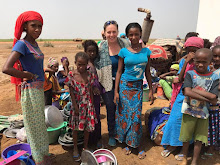
Yesterday I received the Service to American Medal for National Security and Foreign Affairs for the economic programs I have helped to design, procure and launch in Pakistan as USAID's Director of Economic Growth. The day included a federal news radio interview, http://www.federalnewsradio.com/index.php?nid=15&sid=1769116 in the morning and black tie gala in the evening where this video was shown, http://vimeo.com/6738075. This article below was drafted by a local reporter in Pakistan. In my ongoing attempt to help my friends and family understand what I do in Pakistan with USAID, check out these links.
An American Dedicated To Pakistan
USAID officer wins award for focus on economic development
LAHORE – Amy Meyer sits on the floor of a modest apartment here with a dozen Pakastani women surrounding her. A baby crawls toward her, and she picks him up.
“Tell me about productivity,” she asks the group in rapid, confident Urdu bouncing the baby on her knee. “How is your client base growing?”
Cacophony ensues, but Meyer engages each woman one by one and counsels them on the specific problems in their positions as sales agents working to expand markets for female entrepreneurs in cottage industries.
This particular program provides business development services to generate income for women. It is just one of 10 integrated programs Meyer manages for the U.S. Agency for International Development’s Economic Growth portfolio. Others focus on energy efficiency, job skills training, financial services, and food security.
Because of the success of these programs during the past three years, Joe Ryan, Meyer’s supervisor, nominated her for a Service to America medal from Partnership for Public Service, a nongovernmental organization. To Meyer’s surprise, she won. The National Security and International Affairs award recognizes a federal employee for a significant contribution to the nation.
“Amy is doing the best job of any officer I have worked with in my nearly 30 years with USAID. She sets an example for us all,” said Ryan, a USAID/Pakistan associate director. “She deserves the highest recognition.”
Ryan said Meyer’s success lies in a combination of her clear vision about where economic opportunity lies, and a round-the-clock dedication and a near-complete immersion in the Pakistani lifestyle.
Since her arrival in Islamabad in 2006, Meyer has overseen the budget in her program rise from $7 million to more than $200 million. Her challenge, then, has not been acquiring more resources to assist economic growth in Pakistan, but how to use them effectively and efficiently.
“What we have now is an integrated, interdependent program where all the players understand that their intervention has discreet responsibility with respect to the others,” Meyer said. “Workforce development creates job skills, business development improves production.”
To Meyer, the most important fact is that all the programs empower women. Previously, only about one in ten economic development dollars in Pakistan was previously available to women. According to the World Economic Forums Gender Parity Index, Pakistan ranks 127 out of 131 countries in the world.
Some parents and husbands do not want female entrepreneurship despite their need of additional income. Also, unmarried women and their families worry that forays into business, which can involve travel to make sales or working in a mostly male office, might affect their prospects for a husband.
When women overcome family and mobility constraints, however, the opportunities are there. Some couples operate the business jointly, and the husband provides the transportation services, which is successful.
“Some of the women go into business despite their husbands’ disapproval,” Meyer said. “They have expenses, like personal loans or dowries for their daughters, which won’t go away by doing nothing. These are tough women who make decisions for themselves despite the constraints of cultural tradition.” Despite the immense responsibility of managing multi-million dollar budgets, Meyer says she finds immense joy in the on-the-floor meetings and focus groups with beneficiaries she attends in the provinces or hosts at her home in Islamabad.
“No one can articulate needs better than women themselves,” she said. “I can make personal contact with women because I speak the language and I am a woman myself. They can tell me directly how, in partnership with their husbands or brothers, they can take their business opportunities much further.”
Maliha Hussein, a Pakistani economic consultant, said, “[I have] never met anyone at USAID with such clarity and sense of purpose.”
Ryan agrees. “As America’s commitment to the development of Pakistan grows, I hope we can engage more officers of Amy’s caliber and dedication,” he said. “Her unique approach is not easily imitated, but her results are surely enviable.”
Meyer keeps her focus and balances her life with daily yoga and mediation, and a social life with her Pakistani friends and colleagues outside the office environment.
However long she may stay, Meyer says she is grateful for the chance to work on behalf of the American people to assist Pakistan.
“USAID has provided me an opportunity to do things that I could never have attempted without it,” she said. “My service here has been a real labor of love.”
###End###See USAID's official press release: http://www.usaid.gov/press/releases/2009/pr090924_1.html
See Washington Post coverage:
http://www.washingtonpost.com/wp-dyn/content/article/2009/09/21/AR2009092100617.html
http://www.washingtonpost.com/wp-dyn/content/article/2009/09/23/AR2009092304643.html


